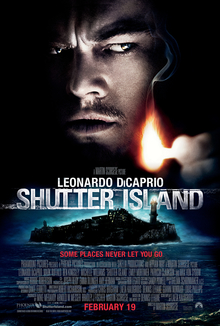The new horror film, “Shutter Island,” based on the popular novel by Dennis Lehane, represents a mid-range and mid-achievement for Scorsese in his post-Oscar phase. The film is dense in imagery but not rich enough in ideas, consistently entertaining but not entirely gripping, stylistically overwrought without being truly poignant.
Grade: B
| Shutter Island | |
|---|---|

Theatrical release poster
|
|
World-premiering at the 2010 Berlin Film Fest, “Shutter Island,” which will be released by Paramount in the U.S. on February 19, should do reasonably well at the box-office (The film, touted to be an Oscar contender, was pushed back from its original late fall date).
Predictably met with resistance, Teddy’s investigation runs into one obstacle after another. Before long, he begins to believe that he’s being manipulated, watched, perhaps even drugged and pushed into the dark edges of his own sanity. Is he being warned away from getting at the “bigger truth” of Shutter Island, or drawn into a horrific medical experiment? And if so, is he a subject or an object? Clearly, there are all sorts of hidden agendas that keep Teddy and Chuck (who barely talks in the first reel) in this frightening, isolated, and impenetrable place.
Gradually, it becomes clear that Teddy has come to Shutter Island devoted to solving a mystery, but that he’s also burdened by his own agenda and secrets. But is her reliable? There’s more to Teddy’s journey than there appears to be.
“Shutter Island” touches on the perennial Hitchcockian theme of appearances versus reality. The movie poses a question asked by all of us, at one point or another in our lives: Am I mad, or is the world around me mad? What’s real and what is not? Subjective versus objective reality? In the best Hitchcockian way, unfolding like a layer cake, the story is constantly jarring us, unsettling our sympathies, shifting and moving in various, unanticipated directions
Though the couple of sleuths, elegantly dressed in brown and beige suits, is starting to build trust, they’re always suspicious about each other’s intentions. At one point, it seems that Chuck is out there to protect Teddy, but later on, it feels he’s pushing him towards a downfall, if not reckoning.
Soon, Chuck, Teddy’s partner, is also swept up in the mysteries and conspiracies on the isle, which surrounded by huge rocks and is experiencing one of the worst torrential rains.
Then there’s Dr. Naehring (Max von Sydow) a former Nazi and one of Ashecliffe’s most ominous and threatening figures, running around with needle in his hand, ready for action. Dr. Naehring represents the other (negative?) side of the psychiatric profession.
Dolores appears, as herself or as an apparition, in mostly bloody, dream-induced deluges.
In her other part, Clarkson is like the Oracle of Delphi, engaged in a ritualistic encounter, but acting “normal,” and playing in straightforward manner with no tricks or gimmicks. She represents another twist and turn within a film that operates on several levels. Just when you think she might provide the truth, or at least some solace and peace of mind, not to mention the journey’s endpoint, you find out that there are more twists to come.
At first, the film seems to be just another intriguing noir detective story but, as it goes along, surprising (even shocking) events and new layers emerge, along with roller coaster twists, with characters getting stranger and stranger.
(Not to worry: All of the story’s carefully-built skeletons of secrets are eventually exposed, if not explained). The story is like an archeological dig, made up of layers under layers.
As noted, stylistically, the movie offers many visual pleasures, as the tale is defined by flashbacks, and flashbacks within flashbacks, period elegance expressed in costumes, altered states of mind, film noir vocabulary, and touches of the Gothic and supernatural genres.
Watching “Shutter Island” is like experiencing a nightmare you can’t wake up from, as it constantly keeps changing, getting darker and darker, stranger and stranger.
End Note:
Budget Shutter Island was popular at the box-office, earning close to $300 million ($294.8 million) against a production budget of $80 million.
Reviewed on February 4, 2010.
Cast:
Jackie Earle Haley
Credits:
Director: Martin Scorsese
Screenwriter: Laeta Kalogridis, based on a novel by Dennis Lehane
Producers: Mike Medavoy, Arnold W. Messer, Bradley J. Fischer, Scorsese
Executive producers: Chris Brigham, Kalogridis, Dennis Lehane, Gianni Nunnari, Louis Phillips
Director of photography: Robert Richardson
Production designer: Dante Ferretti
Music: Robbie Robertson
Costume designer: Sandy Powell
Editor: Thelma Schoonmaker










